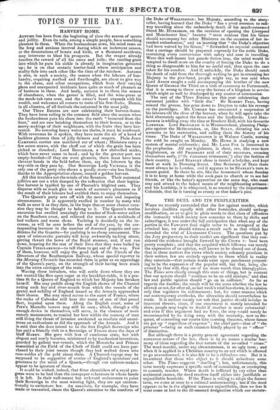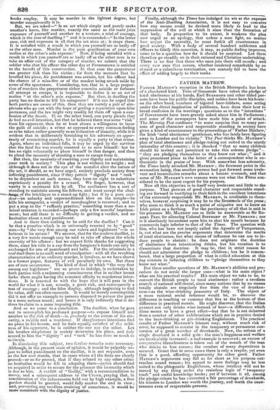THE DUEL AND ITS PERPLEXITIES.
WHEN we recently contended that the law against murder, which involves duellists equally with other homicides, should uodergp modification, so as to give in plain words to that class of offenders the immunity which society now concedes to them by shifts and subterfuges, it was under the full anticipation that when any of the parties in the FAWCETT duel might come to be arraigned at the criminal bar, we should witness a result such as that which has attended the trial of Lieutenant CUDDY. The questions put by the Jury prefiaratory to their verdict are significant that they con- sidered the evidence brought forward by the Crown to have been pretty complete; and that the acquittal which followed was merely the expression of an opinion, well known to be shared out of doors, that in these matters the views which society solemnly proclaim in their written law are entirely opposite to those which in reality they entertain—that certain words exist upon parchment purport- ing to be the expression of the popular will, but that, being dis- owned by that will, they are of no more worth than hieroglyphics. The Times sees clearly enough this state of things, but is content that our system should "continue to be an odd mixture," and that law and public opinion should "go on in collision." As far as regards the duellist, the result will be the same whether the law be altered or not, for after all, as last week's trial has shown, it is opinion only that regulates its enforcement ; but, for some reasons which our contemporary overlooks, the alteration should nevertheless be made. It is neither seemly nor safe that justice should indulge in impotent threats, since, if one enactment is merely intended for show, people may begin to doubt if another is more substantial : and even if this argument had no force, the step would surely be recommended by its doing away with the necessity, now so fre- quent, of converting our courts into morning theatres, where farces are got up "regardless of expense" ; the chief part—that of " the prisoner "—being on each occasion kindly played by an " officer" of distinction.
But although there is a pretty general agreement regarding the scarecrow nature of the law, there is by no means a similar har- mony of ideas regarding the true nature of the so-called "crime." The word murder, under any circumstances, is an ugly term • and when it is applied in a Christian country to an act which is allowed to go uncondemned, it is also felt to be a ridiculous one. But it is incumbent that those who object to it should substitute some other. The Times suggests "duelling"; but, unfortunately, this term merely expresses a specific mode of committing, or attempting to commit, murder. Where death is inflicted by any other than accidental causes, the deed resolves itself either into justifiable or unjustifiable homicide. If the Times is willing to adopt the former term, we come at once to a rational understanding; but if the deed appears to be in the slightest measure unjustifiable, then we fear it must come at last to the ill-omened designation which our statute- books employ: It may be murder in the lightest degree, but murder unequivocally it is.
But, we are asked—" Is an act which simply and purely seeks another's harm, like murder, exactly the same as the mere joint exposure of yourself and another to a venture, a trial of courage, which is the case of duelling ? " and it is contended—" In the latter ease, risk and exposure is all that the act aims at ; it stops there.
It is satisfied with a result in which you yourself are as badly off as the other man. Murder is the pure gratification of your own malice at the other's sole expense." Now, if being satisfied with a result in which you yourself are as badly off as the other man is to take an affair out of the category of murder, we submit that the soldier who shot his officer the other day at Parsonstown is entitled to the benefit of this construction. In that case the perpetrator ran greater risk than his victim ; for from the moment that he levelled his piece, his punishment was certain, but his officer had the chance of a miss-fire or of the musket being struck aside by some of the spectators. Considering, too, that in a large propor- tion of murders the perpetrator either commits suicide or forbears all attempt at escape, it is impossible to define it as an act of malice "at the other's sole expense." But then, in duelling the party has no desire to kill his antagonist ? If it can be urged that both parties are aware of this, then they are merely a pair of sim- pletons who go out with the hope of getting a reputation upon false pretences, and the law might very readily let them off upon a con- fession of the deceit. If, on the other hand, one party pleads that he had no evil intention, but that he believed there was some "risk" from his opponent, then he at least shows a willingness to incur the guilt of suicide; a crime so opposed to every common feeling as to be taken rather generally as an indication of insanity, while it is evident that in deliberately furnishing to his adversary an oppor- tunity of committing murder, he is equally a party to that crime. Again, where an individual falls, it may be urged by the survivor that the fatal fire was merely resorted to to save himself: but he has no right voluntarily to place himself in that danger, and then to plead the necessity of shooting a man to escape from it.
But then, the necessity of asserting your dignity and maintaining your rank in society ? This plea is not without its weight ; and although it does not in the eye of the moralist alter the nature of the act, it should, as we have urged, entirely preclude society from inflicting punishment, since if they permit " dignity " and "rank" to be dependent on such means, they have no right to substitute capriciously a penalty for a reward. We forget, however, that vanity is a sentiment felt by all. The coalheaver has a sort of standing to maintain among his fellows, and must accept the chal-
"vss-ieng,kof the bricklayer to a stand-up fight ; but if by a pure acci- dent—In unlucky and unpremeditated blow on the temple—he kills his antagonist, a verdict of manslaughter is returned ; and to put a stop to the " ruffianly practice," something more than a no- minal sentence is recorded—perhaps only a few months' imprison- ment; but still there is no difficulty in getting a verdict, and no hesitation about a real punishment. And is there then nothing to be said for the duellist ? Can it be that a practice which is so universally resorted to by "good" men—by "the very first among our rulers and legislators "—is so heinous in its nature ? We answer, that for the modern duellist, in a very few words enough may be said to take off almost the whole enormity of his offence ; but we expect little thanks for suggesting them, since his title to a cap from the hangman's hands can only be exchanged for one of pasteboard and bells. For the criminals in a real duel there is no such word of exculpation : with all the revolting characteristics of an ordinary murder, it involves, as we have shown in a former paper, features of evil peculiarly its own. But these are of rare occurrence. The kind of duel in which "the very first among our legislators" are so prone to indulge, is undertaken by both parties with a redeeming consciousness that in neither breast lurks there aught having the remotest affinity to murderous inten- tions. It is resorted to with the hope that it will pass in the world for what it is not, namely, a great risk, and consequently a test of courage ; and the false display, although beginning to find its value, still too often succeeds. It would be merely contemptible did it not offer an example to persons disposed to pursue the game in a more serious mood ; and hence it is only indirectly that it de- rives its claim to a more imposing title.
And so we come to a conclusion. The duellist, when he goes out to accomplish his professed purpose—to expose himself and another to the risk of death—is, precisely to the extent of his sin- cerity, a suicide and a murderer. If slaughterous intentions find no place in his bosom, and be feels equally satisfied of the mild- ness of his opponent, he is neither the one nor the other. Let his brother simpletons in society determine his place, and duly accord to him the " dignity " and "rank" he has done so much to maintaie.
• In dismissing this subject, two further remarks seem necessary. Although, in the present state of opinion, it would be palpably un- just to inflict punishment on the duellist, it is not requisite, even as the law now stands, that in cases where all the facts are clearly proved—or so far proved, that if they related to any other crime no hesitation would be felt in adopting them—juries should find an acquittal in order to secure for the prisoner the immunity which is due to him. A verdict of " Guilty, ' with a recommendation to mercy, and a subsequent address to the Crown, praying that, in consideration of the inducements held out by high example, a free pardon should be granted, would fully answer the end in view ; and, preventing any needless straining of conscience, it would be more consistent with the dignity of justice. Finally, although the Times has indulged its wit at the expense of the Anti-Duelling Association, it is not easy to conceive how any means could be devised more likely to lead to the suppression of the evil at which it aims than the formation of that body. In proportion to its extent, it weakens the plea now urged as an apology, that unless a man fight, no matter how unjust the necessity, he must forfeit all countenance in good society. With a body of several hundred noblemen and officers to falsify this assertion, it may, as public feeling improves, come to be a question bow far it should be received. Let them therefore go steadily on in their rational and Christian undertaking. There is no fear that those who once join them will recede ; and every new case that occurs, whether rendered remarkable by an absurd or a calamitous termination can scarcely fail to have the effect of adding largely to their ranks.



























 Previous page
Previous page